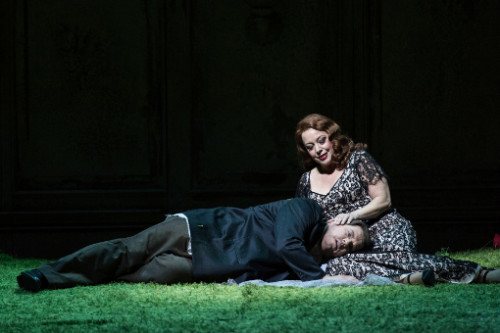 Switzerland Wagner, Parsifal: Soloists, Chorus of the Zurich Opera, Philharmonia Zurich / Simone Young (conductor), Zurich Opera, Zurich 3.3.2018. (JR)
Switzerland Wagner, Parsifal: Soloists, Chorus of the Zurich Opera, Philharmonia Zurich / Simone Young (conductor), Zurich Opera, Zurich 3.3.2018. (JR)

Cast:
Amfortas – Lauri Vasar
Titurel – Pavel Daniluk
Gurnemanz – Christof Fischesser
Parsifal – Stefan Vinke
Klingsor – Wenwei Zhang
Kundry– Nina Stemme
1st Knight – Omer Kobiljak
2nd Knight – Alexander Kiechle
1st Knave – Florie Valiquette
2nd Knave – Karina Demurova
3rd Knave – Spencer Lang
4th Knave – Jonathan Abernethy
1st Flower-maiden – Adriana Gonzalez
2nd Flower-maiden – Hamida Kristoffersen
3rd Flower-maiden – Karina Demurova
Voice from on high – Irène Friedli
Production:
Director – Claus Guth
Scenic assistant – Aglaja Nicolet
Set and costumes – Christian Schmidt
Lighting – Jürgen Hoffmann
Chorus Master – Janko Kastelic
Video Design: Andi Müller
Choreography – Volker Michl
Dramaturgy – Ronny Dietrich
I saw and reviewed this ingenious Claus Guth production of Parsifal nearly five years ago (review click here), on what was then its second revival. I found it an intelligent and thought-provoking production; my view has not changed but I am not sure the local audience will flock to a fourth revival.
We are not transported back to medieval times but to the years between the two World Wars; severely wounded, blinded and traumatised ex-soldiers are being treated in a hospital, set in a large rambling two-storey villa, crumbling appropriately in Act III. The set revolves continually, which makes up for a lack of action in the opera itself. However, the lack of any semblance of a castle (Monsalvat) starts to rob the opera of a sense of mystery and grandeur.
The production simply cannot work at all levels, falling down particularly in Act II where the flower garden ladies don 1920s flapper dresses and feathers and look ready to dance the Charleston. The sensuous seductive music, however, evokes the aroma of a scented garden and its nubile inhabitants. That magic is missing; there is also a lack of theatre when the knights assemble (twice) to administer the King’s bath and it is this theatre which – added of course to the hypnotic music – ultimately should make a performance of Parsifal so impelling. One should leave the opera house in some state of exaltation, if not ecstasy. I emerged rather earth-bound.
I was also looking forward to Brandon Jovanovich giving his role debut as Parsifal but he became indisposed for the whole run, which may be shorthand for a feeling of not being ready for the role yet. His stand-in, no less than seasoned Wagnerian Stefan Vinke, was, I am sorry to say, rather underwhelming. He may be one of the favoured Siegfrieds of the moment, but his Parsifal comes over as not fully formed. It does not help that he hardly ever, in this production, looks the part; but more disconcertingly, his volume wavered continually and often sounded dull. He delivered his main monologues with seeming ease but never with any beauty of tone; I think Jovanovich should thrill more, when the time comes.
For fine voices, we had to turn to others, principally Christof Fischesser’s sonorous bass, perfect for Gurnemanz, in this production the hospital chaplain. I still wish I could concentrate on the glorious music of his great monologue in Act III (‘Du siehst, es ist nicht so….nun freut sich alle Kreatur’) rather than watch a video projection of distressed refugees. Fischesser will, sadly, never displace my memories of the late, great Kurt Moll in the part, who also looked and acted more like a benevolent uncle to the young Parsifal.
Nina Stemme is a sensuous and fine Kundry, as one would expect. Some were concerned that local stalwart Wenwei Zhang might not be up to such a major role as Klingsor, but they need not have feared, he was impressive throughout, looking every bit the malevolent magician.
Estonian baritone Lauri Vasar was a formidable Amfortas, although I would have liked his cries of ‘Erbarmen!’ to have been louder, more heartrending.
Zurich regular Pavel Daniluk now, with increasing age, begins to look more like the Titurel we expect, his sonorous Ukrainian bass voice filling the role well. He also acts better than most.
Of the large group of knights, knaves and flower-maidens my ear was taken with Omer Kobiljak and Alexander Kiechle, with Spencer Lang and Adriana Gonzalez.
The chorus were splendid throughout, well trained under their new Slovenian-Canadian chorus-master Janko Kastelic. In the pit Simone Young had the clear measure of the score, as would be expected of such a seasoned Wagnerian, though my research reveals this might, surprisingly, be her first attempt at a full performance of Parsifal at a major opera house. The orchestra played extremely well for her, especially the sonorous brass; more sheen from the strings would have been appreciated.
Those who admire this opera should certainly try to see this production; who knows if it will be revived again.
John Rhodes
